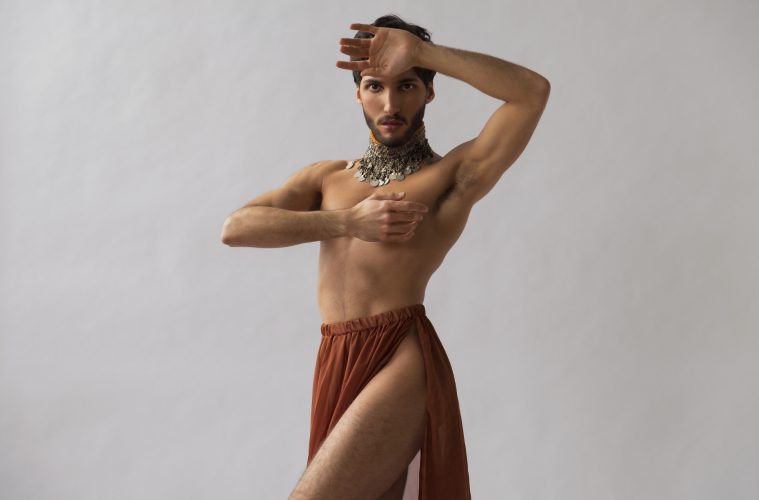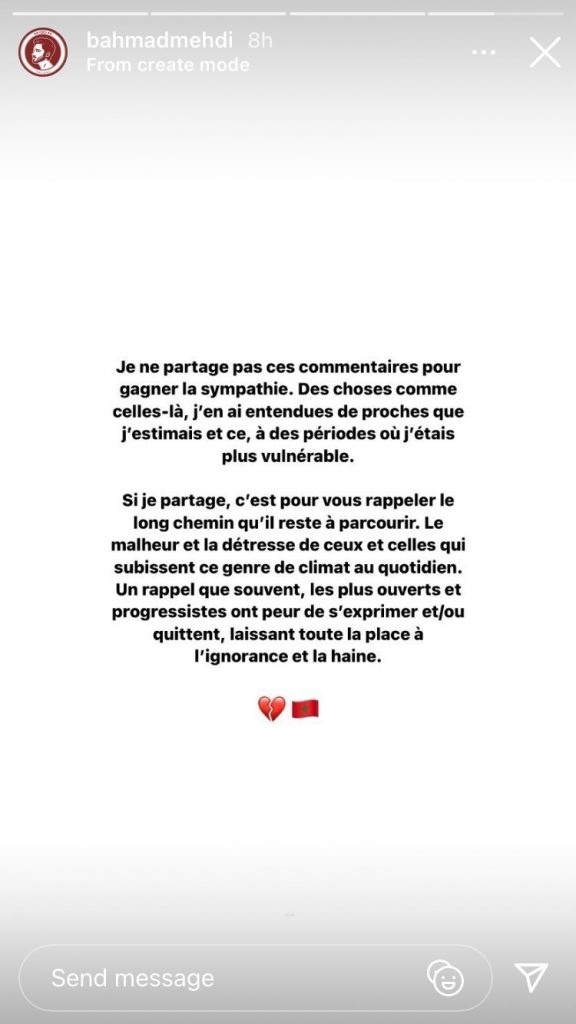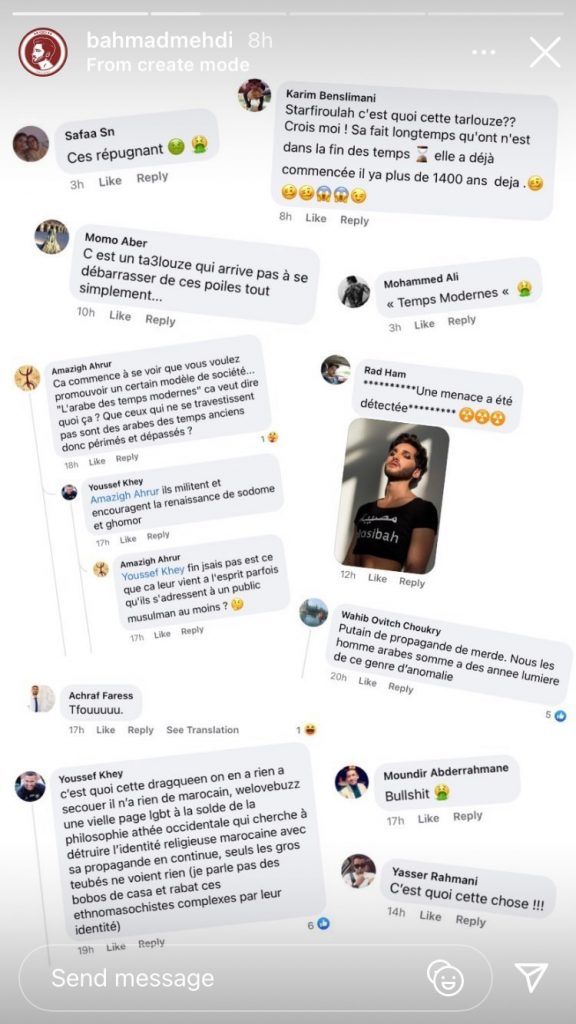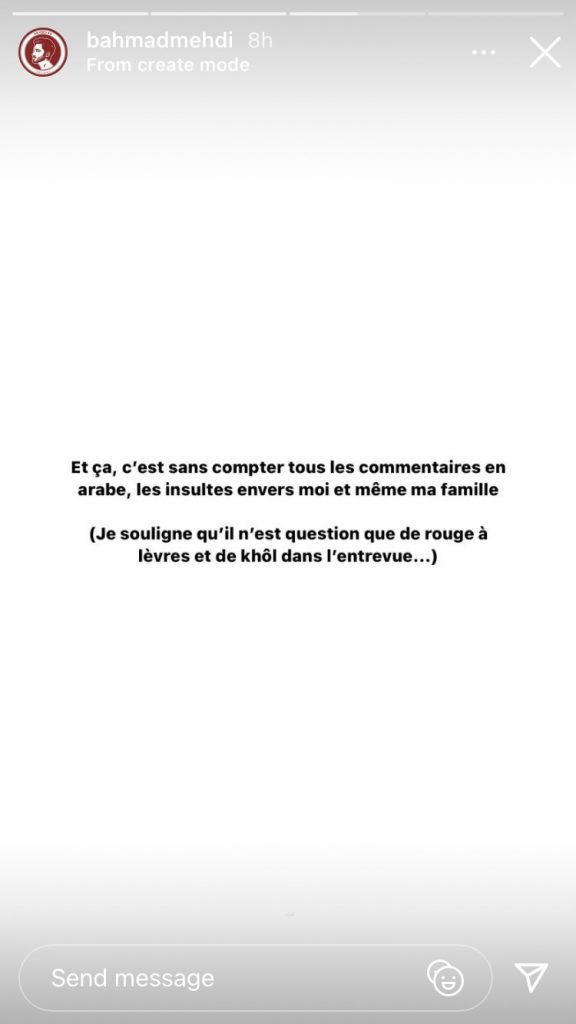Interview by Khaled A.
Photographs: self-portrait during lockdown
Cover design by Atef Daglees
This article is part of the “Hopefully Tomorrow” issue
Whether it’s captivating visuals or dreamy tunes, Moroccan-Canadian artist and musician Mehdi Bahmad (he/him) uses his talents and expertise to bridge the places he calls home in the East and West. He expresses gender fluidity using various Moroccan cultural elements and symbols, and celebrates healing and joy.
Similar to his different intersecting identities, Bahmad’s work rejects labels — it’s genre-bending and multidisciplinary. The birth of his career to the world stage was through his debut EP, Khôl, in which he attempted to confront and work on personal (and collective) healing through “the transformational process of discovering, understanding and accepting [himself] and [his] past.”
Through his award-winning work, which has been featured and celebrated in international music and film festivals across the world, Bahmad aims to continue his work in healing, joy, and dreaming of a future where no one is afraid to be themselves, especially to his community back home in Morocco.
Before we start talking about your work, can you tell us a bit more about your background and how you got to where you are today?
I was born in Rabat, Morocco and spent my summers growing up there, but lived in the South of France with my family before moving to Canada. I was a very introverted child who used to organize my toys in order of size, color, and type rather than playing with them.
I always had an instinctive and strong interest in the arts, but as the son of Moroccan immigrants, doing well in school and pursuing a “notable” career was always expected. I’ve always been fascinated by the human body and I’m also passionate about sculpture. At first, I thought that becoming a plastic surgeon would be a good compromise, but I realized that creation was the very core of my heart and soul though.
I was already writing songs at a young age. Not having the right level of confidence to put my own voice on my lyrics, I hired singers to sing my songs only so I could listen to my music. Until the day I wrote “Lay.” At that moment, I knew I had to perform my songs. They became too intimate and carried a lot of emotional weight. So I recorded the very first version of “Lay” in home-studio. The doors of that universe slowly opened and I caught a glimpse of my artistic persona. Since then, the doors have never closed and never will they.
Mehdi when he was a child, in Morocco
From H.E.N.N.A. and Khol to Amazigh jewelry and dance moves, can you speak more specifically to how your upbringing has shaped your art? How does your queerness play into them as well?
It’s hard to describe it. It’s in me, and I simply let it out. At this very moment, I’m answering these questions from a small café in Morocco and I feel so grounded. Everything here is vibrant, from the people to the music, colors, food, architecture. I think being born in Morocco, but having grown up overseas, made me hold on even stronger to my culture and allowed me to reflect on it with more detachment. My view of Morocco is also still much tinted with the innocence of a child. Such detachment and remoteness gave me the necessary space to reappropriate my culture in my own way, without compromising myself. My queerness is something I had the privilege to explore in Canada, and I’m forever grateful for that. Within my art, I think it mostly expresses itself through gender attribution of cultural symbols and gender fluidity.
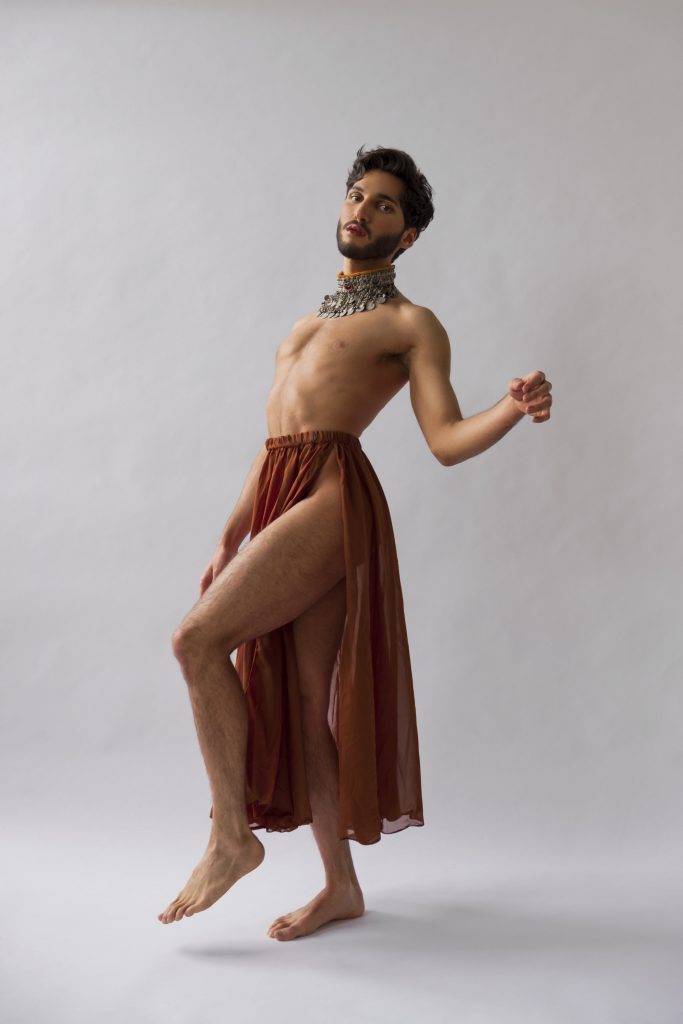
“I just feel like time takes a lot. That’s probably why my work is largely influenced by memories I guess, to make them immortal in a way.”
Mehdi Bahmad
What are the places, people, and smells you call home? How have they evolved with time and influenced your art?
Most of my family still stays in the same neighborhoods in Morocco. There’s nothing I love more than going back to their homes where I’ve made so many warm memories. I love watching my family slowly dozing off after the afternoon tea time. I love going to the corner store (mol l7anout) with my belgha to buy some bread and sodas for dinner. I love how everything is so much more informal and laid-back.
Things obviously change, though, and witnessing my family aging breaks my heart. I think this made me the extremely nostalgic person I am; time is very scary to me. Every time I come back to Morocco, a cousin gets married, another one moves to another country, an aunt gets sick, an uncle passes away, etc. And the shock is even more painful because I don’t get to see the evolution; it’s drastic. I just feel like time takes a lot. That’s probably why my work is largely influenced by memories I guess, to make them immortal in a way.
When did art grow on you, and who/what is your inspiration? What forms do you aim to expand your art into in the future?
I’ve been interested in art since I can remember. I was a Disney-obsessed kid and spent my entire time watching Disney classics, pressing pause at my favorite shot of the movie to put a sheet of paper on the TV screen and trace it. I was around 3 years old. Then I discovered pop divas (the two firsts were Shakira and Nancy Ajram). I kept waiting for my favorite music videos to play on TV and drew the different scenes and outfits. Later, when YouTube appeared, I learned many choreographies simply by watching music videos and live shows over and over. I always kept this passion and fascination for pop culture. I’m really looking forward to expanding movement and dance with the new projects I’m working on. I want to put performance at the center of my work.
Your debut project, Khol, presented a vision of healing and a more optimistic future. What do you think that reflects on your most recent single, “Sukkar,” and your other future projects?
Khol was indeed about healing, the transformational process of discovering, and understanding and accepting myself and my past. It was in a way the birth of my artistic persona and helped me embrace my voice. Not that I’m fully healed now but I’m definitely more in peace with what has hurt me. Now that I acknowledged and shared some of my darker sides, I can sing about what I envision for myself and all of us. Khol is about what I didn’t necessarily choose to go through while my new work is more about where I am and want to be. So I’d say it’s definitely more confident, unapologetic and, yes, optimistic.
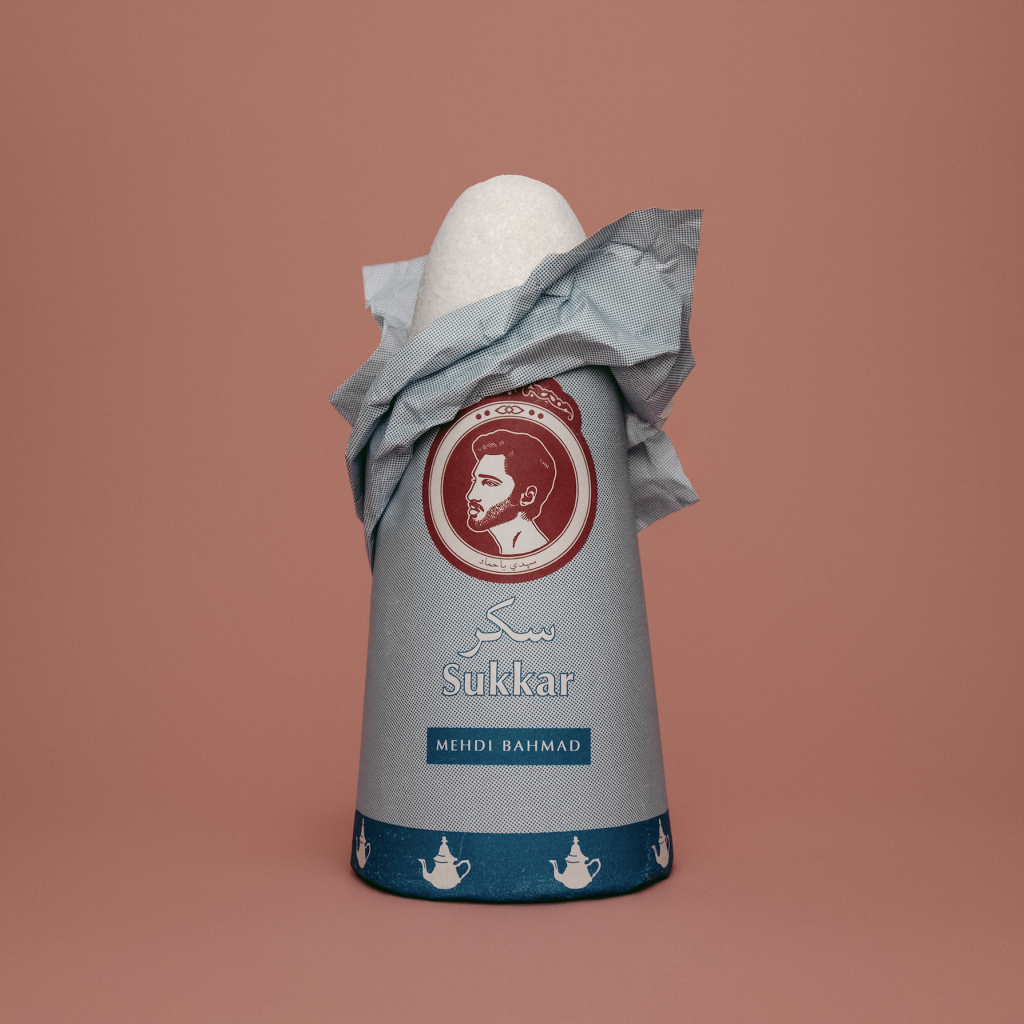
Artwork for Mehdi’s single, “Sukkar,”
Your music and visuals are a celebration of joy and empowerment. In a region where queer and trans people are deprived of them, how do you feel when your music sparks hope and ability to imagine a freer future?
I feel privileged and heartbroken at the same time. But most importantly, I feel hopeful and confident that it will change in a not-so-distant future. Things have already begun to change. I know how it feels to repress yourself and feel like you can lose everything simply for being yourself; It’s the reason I wanted to make my own personal “secret garden” when I didn’t feel safety was accessible for all of us. This inner world is what truly saved me, and I hope it can help my sisters and brothers, too. Even though the world can seem to be dark at times, I sincerely believe art can help us heal and grow all together.
Your music has been described as being at the “intersection of East and West.” How do generalizations like these make you feel when different aspects of your identity have been cast out in both places? Does it impact your art?
I actually find it very positive and empowering: I have the freedom and power to build from what suits me best on both sides. I’m proud to contribute to creating bridges and some kind of grey space to discover and shape. I also want to incorporate more Darija and French in my upcoming music.
Does you have any plans singing in other languages that you pay homage to in your videos (e.g. Arabic, Darijah, etc.)?
Absolutely. I want to incorporate more Darija and French in my upcoming music.
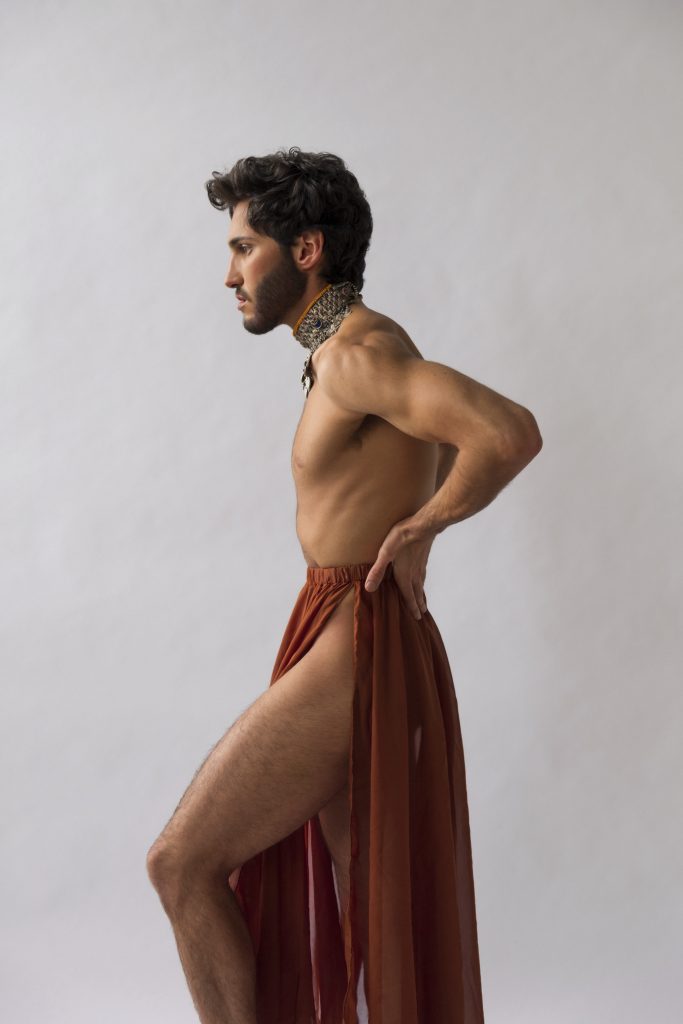
self-portrait during lockdown
With the emergence of queer and trans Middle Eastern and North African (MENA) creatives in the West, do you think their homes will embrace their art? How does the future of their art (and yours as well) look like in relation to the region?
I try not to think so much about that. If I did, I feel like it would impact my work, and I’d involuntarily censor myself. I’m an overthinker, so I do my best to stay focused to not panic and feel overwhelmed. I kind of live in denial when it comes to how my art is perceived in Morocco. I simply walk the walk, do my thing, and hope it’ll help make things evolve in the region from abroad. I dream that we’ll all feel welcome on our own land one day. I’m hopeful this day will come — there are so many beautiful and powerful voices rising up.
Queer and trans MENA creatives are often burdened with “representing” the entire community because of their limited visibility. Do you feel this burden when it comes to the issues of the queer and trans community in Morocco? Are you familiar with them?
Of course I do. Again, I’m by nature an anxious over-thinker, and I’m very careful not to hurt anyone. I wouldn’t want what I say or mean to be misunderstood. So sometimes, I just prefer to let my work speak instead. To give you an example, when that Grindr witch-hunt happened in Morocco last year, I couldn’t stop thinking about it but wasn’t able to speak out. It took me more than a week to make a simple story about it. I felt a lot of pressure. I feel like everyone’s on their guard (and rightfully) when it comes to sensitive issues. And with our cancel-culture, it just feels like walking on eggshells all the time. I learned that to be able to keep creating, I need to avoid that paralyzing burden feeling. In all honesty, I consider myself as an artist, not an activist. The social change I aim to spark expresses itself through my work — that’s my contribution to our community.
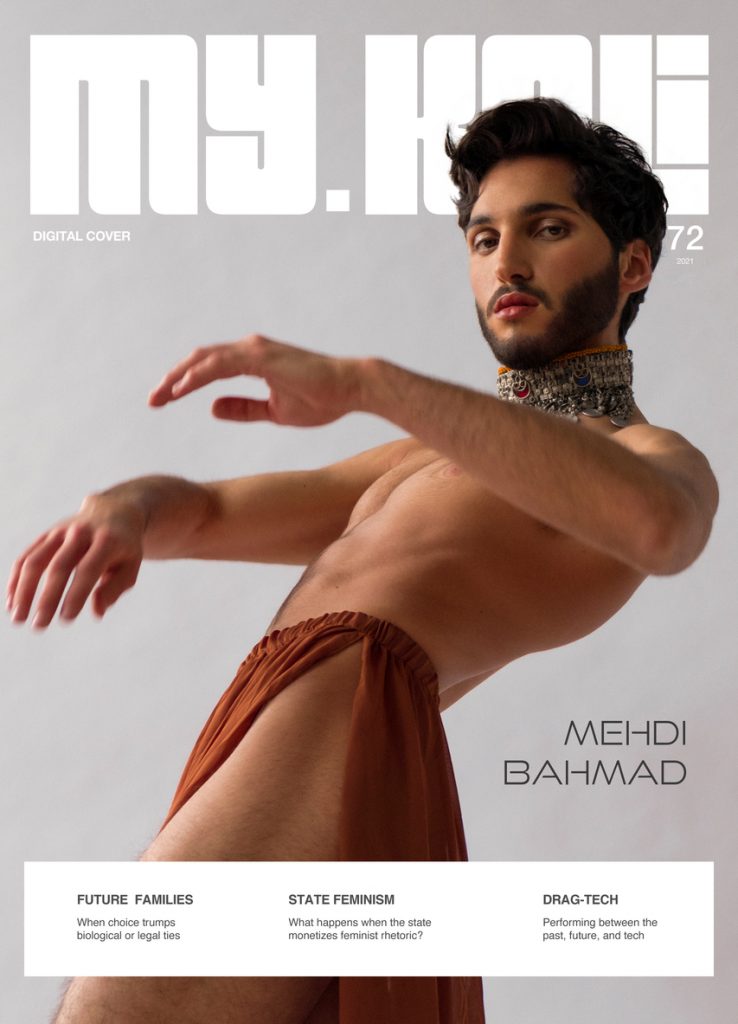
“In all honesty, I consider myself as an artist, not an activist. The social change I aim to spark expresses itself through my work — that’s my contribution to our community.”
Mehdi Bahmad
Mehdi Bahmad on the Arabic cover of Issue #72: Hopefully Tomorrow
To follow up on that, why did you feel so much pressure to make a story about the Grindr witch-hunt, and what allowed you to overcome this pressure?
In addition to what I said earlier, there’s also a little voice in my head telling me it’s not necessarily my place to speak. I’m aware that I’m privileged to live in Canada and I wouldn’t want to speak for someone who actually lived the situation and suffered from it, even though it did affect me. In a way, I don’t want to be “appropriating” someone else’s “issue” if I didn’t experience it as much as they did. You know what I mean? It took me years to find my voice and I’m really afraid of overshadowing someone else’s. However, I’m completely aware that this is a very personal struggle coming in part from my inner saboteur and the lack of affirmation I grew up with. I’ve been taught to keep my beliefs for myself if they could raise controversy. During those moments, I simply need a little time to remind myself that I’m not “stealing” anything when I speak and I’m not causing harm when I stand up for my beliefs.
You have also faced a wave of homophobia on social media, following the February 8, 2021 release of an article/interview in Moroccoan magazine, Welovebuzz. You posted about these attacks on your Instagram story and wrote, “there’s work that needs to be done.” I was wondering if you could say more about how these attacks impacted you and what work needs to be done?
I was having dinner outside when I first read the article and the comments on Facebook. I can’t even remember what I ate or how I got back home to be honest. I felt dizzy and sick for a few hours. I was very excited for this interview, especially being the first with a Moroccan media. It felt like I was accessing my homeland professionally for the first time. Plus, I was eager to reach out to my Moroccan people. When all the hate started, claiming I was “far from being Moroccan” and was harming our culture, particularly from random people, I felt like I was brutally brought back to the sad reality. Paradoxically, I also received an unprecedented wave of support behind the scenes. People reached out with meaningful, felt, genuine support through DMs. It really warmed my heart and helped me through the process because it reminded me that the open-minded and receptive people are there; they’re just not comfortable yet to speak up publicly.
Screenshots of Homophobic interaction shared by Mehdi on his Stories/Instagram
What we need to do is not give up on our beliefs or our culture. I know the pressure is hard to deal with, and that there’s also fear. I completely understand that, sometimes, it’s easier and safer to just retire. But by doing so, we leave them the entire space to fill with their hate and ignorance. It’s not easy and we might not see concrete results from our battles, but we have to think about long-term and keep the bigger picture in mind: we’re doing this for the freedom of future generations.
Also, I’m grateful for my ability to find ways to grow out of negative experiences. I’m totally aware that I’m bringing up sensitive topics and that I will sadly have to face these kinds of reactions in order to make things change. I spent enough time feeling like I had to choose between my values and my culture, and I will never again. My culture is as much mine as it’s “theirs.” I reclaim it, I live and breathe it, I celebrate it, and I suffer from it. It’s in me and they can’t take that away.
“Cancel-culture” seems like a relevant issue in both of these issues, and is something that pushes many creatives to be cautious about their work. Can you tell us more about your experience with it? When do you think it can be effective, and when does it become toxic?
It’s more than necessary to understand the weight of our words and actions, especially in this day and age. I think this is positive because it forces us to become more aware of the impact of what we say or do. Although, it quickly becomes toxic when there’s no room for mistakes and growth. We’re human beings; we learn, we change and hopefully, we evolve. I feel like there’s not much compassion and tolerance left lately. I do understand that we’ve reached a point of saturation though (especially since 2020) but I also think it reflects our consumer society. When something isn’t what we want or expect, it’s extremely easy to get rid of it and replace it. We get bored so easily and don’t have the will and patience to try to understand anymore. We want to cancel or swipe people in real life, which saddens me. “Thank you, next.” I think it contributes to the deterioration of the quality of our relationships and fuels an individualist culture of performance. We’re all different and complex. I believe that perspective and context are key in accepting that one’s reality isn’t the same as someone else’s.
Another and perhaps more widespread pressure is that inflicted or perpetuated by the people closest to us… a parent, a sibling, a neighbor. How might creatives navigate fighting these systems when the experiences are so personal?
I can’t speak for all creatives, since we all have our own background, perspectives and approach. But speaking for myself, I had to create my own world, a safe place shielded from these systems… like the “secret garden” I mentioned earlier. I often refer to my artistic persona: he’s the unattainable one my relatives can’t argue with for example. I think this psychological distinction plays an essential role both in my work and in my personal life. Being a highly sensitive person, detachment is what helps me to keep going.
How do you envision the future of the queer and trans community in the region generally, and Morocco specifically? How do the future of your personal narrative and art fit into that vision?
I personally hope people learn to see beauty in our differences instead of seeing it as a threat. They need to understand that the only threat is people leaving their country behind without ever looking back because they feel like they don’t fit in or are rejected. Most of my generation in Morocco is leaving or hopes to leave one day, not just the queer and trans community. Who will perpetuate our culture then?
I wish no one would have to feel unsafe for being themselves. I dream of a world that wouldn’t be so fragmented, where community would refer to the human race as a whole. In this world, I wouldn’t have to answer so many interrogating questions about my queerness, because I’m so much more than that. My queerness is only one aspect of my identity, among so many others. I don’t define myself solely by it, and that’s probably why I can navigate through life so naturally… it might be one of the rare things I didn’t overthink to be honest.
My dream might be idealistic, but I sincerely hope and believe we’ll get there one day. I’m not sure if I’ll ever get to experience it but I sure need to be part of those who will allow others to do so. This is what my work is all about.

